#African Identity and Beauty
Explore tagged Tumblr posts
Text

Beauty Skincare Model Skin Routine Cosmetics Makeup Photo Ethnic African "Embarking on Beauty's Journey: A Glimpse into the Skincare and Makeup Rituals of an Ethnic African Model."
#pretty girl#beautiful women#pretty woman#Timeless Beauty#Model's Beauty Routine#Ethnic African Heritage#Cosmetic Mastery#Flawless Makeup Application#Beauty Transformation Insights#Cultural Diversity in Skincare#Daily Beauty Regimen#Model's Makeup Proficiency#African Identity and Beauty
0 notes
Text






















mamas fighting for freedom power equality of gender and gbv
13 notes
·
View notes
Text
Shoutout to all Asian LGBTQ+ folks.
Shoutout to all Bruneian LGBTQ+ folks.
Shoutout to all Burmese LGBTQ+ folks.
Shoutout to all Cambodian LGBTQ+ folks.
Shoutout to all Filipino LGBTQ+ folks.
Shoutout all Hmong LGBTQ+ folks.
Shoutout to all Indonesian LGBTQ+ folks.
Shoutout to all Laotian LGBTQ+ folks.
Shoutout to all Malaysian LGBTQ+ folks.
Shoutout to all Mien LGBTQ+ folks.
Shoutout to all Singaporean LGBTQ+ folks.
Shoutout to all Timorese LGBTQ+ folks.
Shoutout to all Thai LGBTQ+ folks.
Shoutout to all Vietnamese LGBTQ+ folks.
Shoutout to all Afghani LGBTQ+ folks.
Shoutout to all Armenian LGBTQ+ folks.
Shoutout to all Azerbaijani LGBTQ+ folks.
Shout to all Georgian LGBTQ+ folks.
Shoutout to all Kazakh LGBTQ+ folks.
Shoutout to all Kyrgyz LGBTQ+ folks.
Shoutout to all Mongolian LGBTQ+ folks.
Shoutout to all Tajik LGBTQ+ folks.
Shoutout to all Turkmen LGBTQ+ folks.
Shoutout to all Uzbek LGBTQ+ folks.
Shoutout to all Chinese LGBTQ+ folks.
Shoutout to all Japanese LGBTQ+ folks.
Shoutout to all Korean LGBTQ+ folks.
Shoutout to all Okinawan LGBTQ+ folks.
Shoutout to all Taiwanese LGBTQ+ folks.
Shoutout to all Tibetan LGBTQ+ folks.
Shoutout to all Bangladeshi LGBTQ+ folks.
Shoutout to all Bhutanese LGBTQ+ folks.
Shoutout to all Indian LGBTQ+ folks.
Shoutout to all Maldivians LGBTQ+ folks.
Shoutout to all Nepali LGBTQ+ folks.
Shoutout to all Sri Lankan LGBTQ+ folks.
Shoutout to all Pakistani LGBTQ+ folks.
Take pride in it all. Your culture, your identity, it’s all so beautiful. Celebrate where you are from and who you are. It makes you you, and that is something to be proud of.
post for Pacific Islanders, post for Middle Easterners, post for Oceanic folks , post for Hispanics, post for Africans, post for Native Americans, post for Caribbeans
#mental health#positivity#self care#mental illness#self help#recovery#ed recovery#pro recovery#actuallytraumatized#actually cptsd#lgbt#lgbtq#lgbtq representation#lgbt positivity#lgbtqia#lgbtq positivity#lesbian#gay#bi#bisexual#trans#transgender#Asia#Asian#pansexual#asexual#aromantic#transmasc#transfem#nonbinary
3K notes
·
View notes
Text
THREE NEW SHARK SPECIES THIS WEEK!
The second week of July 2023 something extraordinarily beautiful happened, the findings of 3 new species of sharks for were announced
A new angel sharks species was identified, from the western Indian Ocean on the Mascarene Plateau and off southwestern India in 100–500 m depths, the Lea’s angel shark Squatina leae, was recognized to be different genetically and morphologically distinct from its congeneric species Squatina africanae, following unique morphological features. This species was first detected in 1988 after finding three unusual, small sharks, but till today was completely understood. The angel shark is named after one of the author’s fiancee’s late sister, Lea-Marie Cordt.
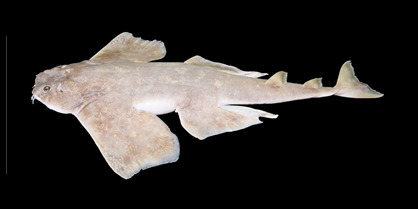
- Squatina leae, adult male, in dorsolateral.
Angel sharks are “flatter sharks”, possesing distinctly broad, dorsoventrally flattened bodies, a short snout with large mouth and nostrils, eyes on top of the head close to the large spiracles, very large pectoral fins, and a lateral caudal keel. They've evolved to be ambush predators, they lie in wait for prey to pass closely overhead before attacking.
Reference (Open Access): Weigmann et al., 2023. Revision of the Western Indian Ocean Angel Sharks, Genus Squatina (Squatiniformes, Squatinidae), with Description of a New Species and Redescription of the African Angel Shark Squatina africana Regan, 1908. Biology
From North Australia, another species of hornshark is described based on six whole specimens and a single egg case. The painted hornshark Heterodontus marshallae was previously considered to be the same with the zebra bullhead shark another well know bullhead shark from the central Indo-Pacific from Japan to Australia, but genetic and morphological analyses indicated the sharks were different, but looking alike. The painted hornshark is endemic to northwestern Australia and occurs in deeper waters, at 125–229 m below surface.

- Lateral view of two mature female painted hornshark Heterodontus marshallae showing small differences between individuals
The painted hornsharks is named in honour of Dr. Lindsay Marshall www.stickfigurefish.com.au a scientific illustrator and elasmobranch scientist who expertly painted all the sharks and rays of the world for the Chondrichthyan Tree of Life Project.
Reference (Open Access): White et al., 2023 Species in Disguise: A New Species of Hornshark from Northern Australia (Heterodontiformes: Heterodontidae). Diversity.
And from an unidentified shark egg collected from the deep waters of northwestern Australia, in 2011 recently helped researchers identify a new species of deep water cat shark. Called ridged-egg catshark Apristurus ovicorrugatus after its eggs, it was collected in the earlys 90 but remained unknown to date. This sharks presents white eyes, and is small in size, reaching less than a half meter in length. .
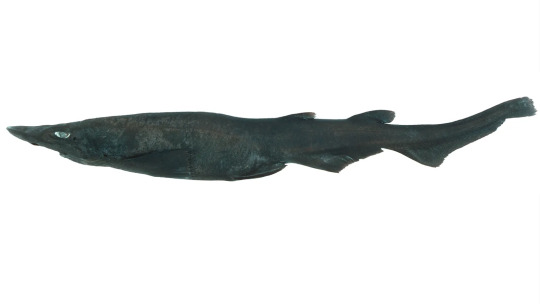
- Lateral view of female Apristurus ovicorrugatus before preserved. Photo by CSIRO.
Egg cases belonging to this species had been documented as early as the 1980s, but could not be matched to any species of Australian shark until recently scientists examined a shark specimen of previously uncertain identity in the CSIRO collection.
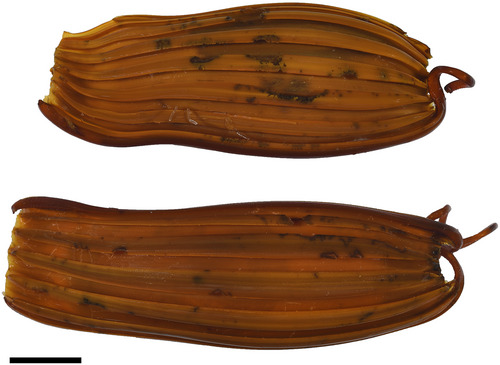
-egg cases of Apristurus ovicorrugatus. Scale bar is 10 mm
Reference (Open Access) White,et al., 2023 What came first, the shark or the egg? Discovery of a new species of deepwater shark by investigation of egg case morphology. Journal of Fish Biology.
#Squatina leae#Squatina#new species#elasmobranch#shark#biology#marine biology#science#marine science#indian ocean#bioblr#sciblr#sci#painted hornshark#Heterodontus marshallae#Heterodontus#Apristurus ovicorrugatus#Apristurus#long post#Ridged-egg catshark#Lea’s angel shark
3K notes
·
View notes
Note
Just wondering what your thoughts are on transracial. Do you think it's a valid identity? Why/why not?
I think a lot of trans-activists seemingly ignore the issue. If people can change their gender and expect everyone to validate their feelings and experience, what's so different about people wanting to change race?
Nope.
I don't have an opinion on that at all.
If you want to fight a radqueer, you can. Radqueers are generally and genuinely hated by the LGBTQ+ community.
Your thought process is "If they can identify as a different sex, what else could they identify as?" right?
When I was younger and understood a lot less about what transgender was, I thought that too. I did.
But it's just not the same.
Race isn't random, it's DNA, and it's based on genes and your parents genes. It has some differences on how it affects bodies, like hair, but those aren't random. It's based on ancestry and the mix of genes between your parents.
What sex somebody is is not based on genes.
I see how you could make that comparison. I understand that it can seem like the same thing. But it's really not.
Trans women are women. They feel like women, they are women. They are women. Their downstairs may not reflect that, but they are women.
As your ask said, transrace WANT to change race.
Like, I think that African American hair is really cool. It looks beautiful. Thats basically what people who say they're 'transrace' think, but they take it to an extreme by comparing their experiences to transgender people.
Trans women don't look at women and think "Oh, wow, beautiful. I must be transgender." like, that's not how it works. It's difficult to describe, but it's more like a 'That is me.' feeling.
Hope this helps!
#is this the 'radfem gotcha moment' or smthn#anyway if we said anything wrong here please let us know!!
160 notes
·
View notes
Note
This may be a dumb question but is there a difference between canerows and cornrows? Is one more correct to say, or is it literally just it depends on where you live? Just wanna make sure I say it right when describing a character's hairstyle. Thank you for all your work!
So I had a feeling that it was the same, that maybe cane would be like growing sugarcane, the way cornrows were like growing corn. And I was right! Apparently canerows is used by Black people in the Caribbean.
"Black hair culture in the Caribbean, UK, and US continues to be exploited by colonialism. Various different Black braiding styles are often lumped together in the West, and instead of knowing their individual names, they directly reference an enslaved past. Cane/cornrows are more significant of which crops the enslaved were forced to cultivate — sugar cane or corn — than the beautiful traditions of African and Black hair braiding. The symbolism in the generic use of "cane/cornrow" discourages people from accepting that Black identity and culture existed centuries before colonialism. It's impossible to move past the pain and prejudice of our ancestors until we unlearn and understand how it continues to shape our lives."
Idk if I'm gonna automatically stop calling them cornrows, but this definitely gives me a new perspective to check myself on (as well as the Yoruban term) for this hairstyle!
"As discovered in Don't Touch My Hair, the classic straight-back rows of hair braided closely to the scalp is called "kolese" in the Yoruba language, which means "a creature without legs", like a snail. "The name is one that centers the specific characteristics of Afro-textured hair and is in reference to the way our hair curls up at the nape of the neck when it is braided in this direction," writes Dabiri on Twitter. While kolese most closely resembles the classic straight back cane/cornrows, the general term for cane/cornrows in Nigeria is irun didi."
171 notes
·
View notes
Text
PAC: June 2024 Predictions
Hello beautiful people! Continuing on with my summer 2024, I am kicking off this upcoming June with predictions! I look forward to posting more content relating to this topic and many others. I also want to say that tomorrow, I will be having a Five Dollar Friday Sale so if you would like to receive a reading for a lower price, tomorrow is the day to do so! Without further ado, please choose the image that resonates with you!
Top Left-to-Bottom Right: (1-4)
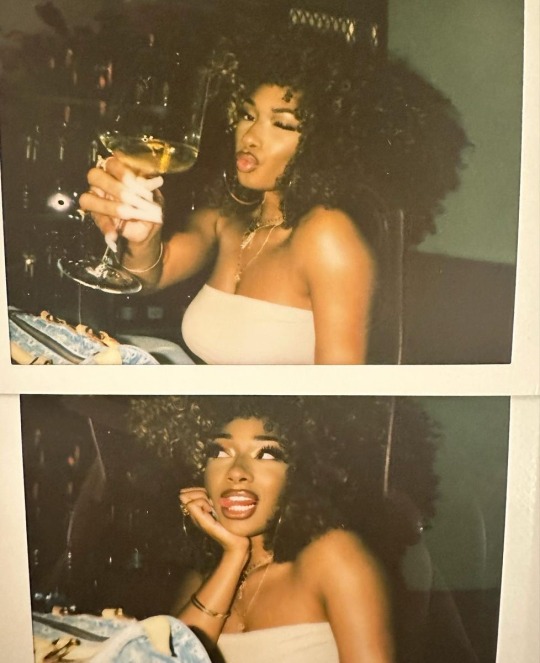
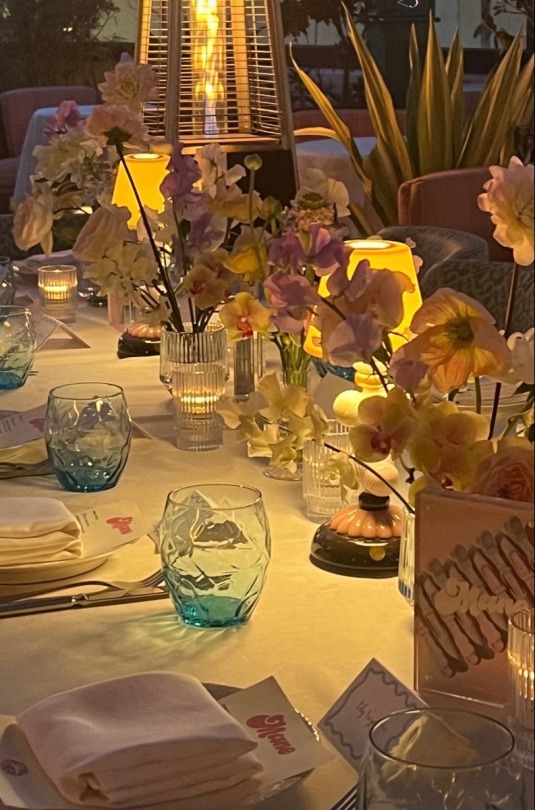

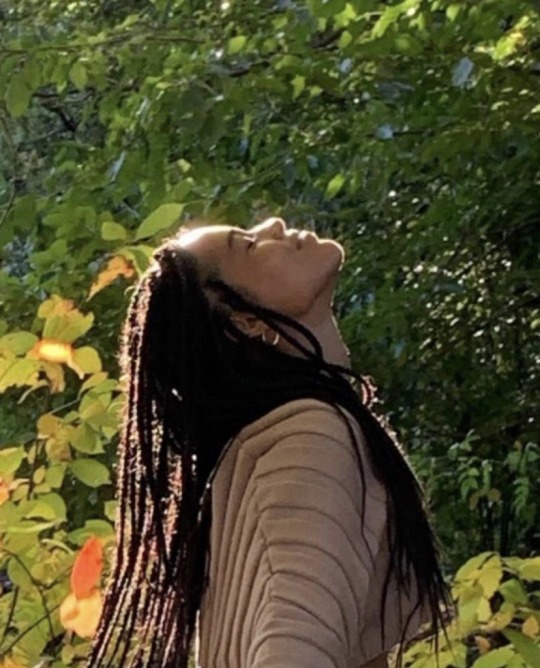
Pile One: This pile is definitely geared towards femmes of the African diaspora. I feel like you will be more knowledgeable about your culture. You will take more pride in your identity this month. Happy Juneteenth in advance <3! I also feel like this month will be perfect for you to brush up on skills like crocheting, quilt making, jewelry making or sewing. I see that you’re a versatile person who has many sides so do not be afraid to show them. I feel like this month you will be rewarded with recognition due to your connections with women. If you are someone who struggles when it comes to intimacy with women, do not fear what can work for you. This month is crucial for you. I feel like you need to be paying close attention to cameras. People will be videoing you and taking pictures of you heavy this month. You might even go viral. People will also be more generous towards you this month. You may even notice people being more flirtatious with you, offering to pay for your drinks/food, etc. Some of you are going to be traveling down South, specifically Mississippi, Alabama and Georgia. If you have a sexual partner, you will get into an argument with them about something trivial. It will be blown out of proportion but I will say this. There is a reason why you feel the way you feel about them right now. Your gut never lies, love. And lastly, you may get invited to a surplus of dinner dates, picnic dates and family friendly places like Top Golf, Dave N Busters, etc. And be sure to keep your spiritual protection up!
Cards Used: Wheel of Fortune, 7 of Cups, 6 of Cups, 8 of Wands (RX), 5 of Wands, The Star, The Empress, Judgment, King of Wands.
extras: buying hair picks. reaching a fruit tree. jamaican flag. acorns. nature lover. egyptian goddess. play for keeps. buckaroos. monkey island.
Pile Two: Who lit a fire under your ass, Pile Two? I feel like this month will be about spoiling yourself and letting people know that you are not to be played with. It feels like you are finally standing up for yourself after being punked for so long. Think of this time as charging up and gaining your power. This is the era of reclaiming your power. You are going to be realizing your worth and it will feel so good. A lot of you guys are newly single and now you feel spiritually lighter. The weight of your past relationship turned you into someone you weren’t. Healing is not a linear journey so you need to be as patient with yourself as possible. Some of you will be taking up a pottery class, will start pole dancing or start gardening to help you cope with your situation. You are more in control of your situation than you think. It’s time to want better for yourself and to do better for yourself. Out with the old, in with the new is what I heard. If you’ve been talking about starting up a business or starting up a podcast, then get on it! Type up that business plan and brainstorm some topics to talk about (preferably some unrelenting to splitting the bill or the criteria of being a feminine). This month, you could also do some traveling. It could be in the Northern parts of the U.S. or even in the Caribbean. I feel like your main focus will definitely be getting rid of the dead weight though. Clearing up your face, cleaning up your diet, physically cleaning your room, all of that. Just do it!
Cards Used: 5 of Discs, King of Swords, Queen of Swords, Knight of Discs, 6 of Swords, Temperance, 9 of Discs, The Fool
extras: revenge body. health nut. being more strict. podcast listener. kendrick lamar fan. maracas. greece. puerto rico. haitian. fixing insecurities.
Pile Three: You guys are definitely under 5’4”, lol. I feel like you could be an aspiring model or dancer. You could even be an aspiring rapper. I feel like you guys have a resting bitch face and because of it a lot of people accuse you of being mean when you really aren’t. This month, you could find yourself trying to overcompensate for that, lol! You may find yourself doing yard work for your neighbors, putting up flyers for someone’s local business, taking out someone’s trash, moving someone’s car for them, picking up your s/o’s sibling/mother up from work/school. I also see you guys purchasing a new wig with color in it or a pair of Lady Gaga-esque heels from Poshmark or Depop. You guys have a gothic sense of style. During the month of June, you will definitely be partying with the gays (probably only on the weekends though depending on your schedule). Happy Pride Month <3! I think that you guys will be doing things that will get you out of your comfort zone, specifically going out at night. The nightlife will be calling your name, dear. You will be bombarded with attention when this does happen. You are socially awkward but it’s okay, they won’t bite. The environments where you’ll be at will be filled with welcoming characters that make you feel safe. I feel like some of you will be trading services with another business owner (i.e., hairstyle for nail set, reading for reading, etc). Lastly, you guys need to go to karaoke bars, gay bars, go bar diving! Your self-esteem will go up, lol!
Cards Used: The Hermit, King of Cups, 7 of Cups, The Star, 2 of Swords (RX), Strength, 6 of Wands, The Tower.
extras: studded heels. drunk selfies. smoked out eyeliner. dragged. tea. money-hungry. marge simpson. katniss everdeen. facts about the royal kingdom.
Pile Four: This month will mark a special meeting between you and another person. A lot of you guys will be attending a wedding ceremony during this month, if you’re not already getting married. If you are getting married, just know that the stress is worth it dear. The ceremony will go great. But for the single folks, I feel like guys have been having a bad streak when it comes to dating/love. This will change at the wedding reception/ceremony. You will either meet someone who is exactly your type or you will catch the bouquet. I see that this person is tall, bright-eyed and very charming. This person will change your perspective on life. Outside of love, I feel like you guys will be working at some type of charity event. If you work somewhere with children involved, you will be assigned as the leader for the big task. You will handle it well. You could be in your 9H profection year or you could just be looking for your purpose in life. I feel like you will expand on your beliefs. You will visit different places of faith, travel to different neighborhoods and try new foods just to get a new perspective. I also think you will listen to music of different genres more often, specifically music with an island feel to it. If you have a science test coming up, you will pass it. And lastly, I feel like by the end of the month you will be on vacation. Whatever is going on at work will make you want to take a break. I see someone drinking RedBull to get through the day. I am also channeling the movie ‘The Last Holiday’. You should watch it! There is more to life than just working. You have some exploring to do, friend.
Cards Used: 9 of Wands, Temperance, 3 of Wands, The Hierophant, Queen of Cups, 3 of Discs.
extras: moonwalk. euphoria. small fry. tupperware. black lives matter. sagittarius placements. jupiter heavy. buoyancy. shameless (2011).
#law of assumption#manifesting#neville goddard#tarotreading#hoodoo#astro notes#pick a card#pick a pile#divination#tarot#daily tarot#tarot deck#pac reading#tarot reading#pick a reading#tarotcommunity#spirituality#tarot cards#tarot pick a card#free tarot#tarot witch#tarot community#metaphysical#occult#paid readings#tarot pac#tarotblr#witch#witchblr#intuitive readings
314 notes
·
View notes
Text
It has to be said
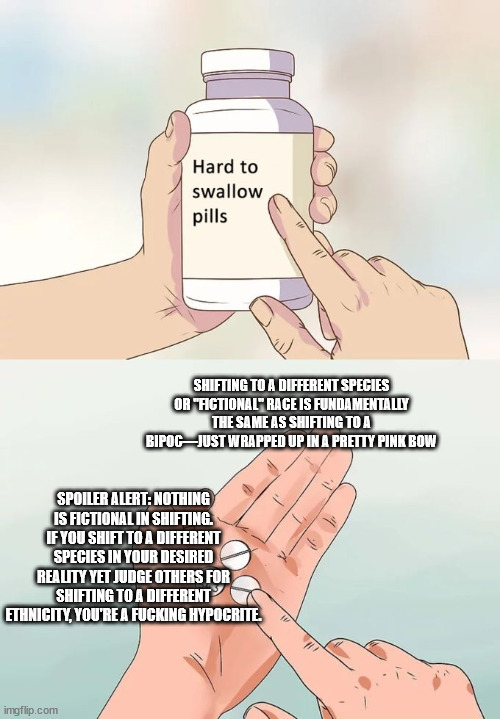
Let’s cut the bullshit. You can’t sit there and preach about how "wrong" it is for someone to shift into a BIPOC identity while you’re out here shifting into some "fictional" race and acting like it’s all good.
Newsflash, asshole: It’s the same damn thing. Shifting into any race—real or fictional—comes with its own set of cultural, historical, and ethical baggage. If you’re gonna throw shade at someone for exploring a BIPOC identity, then you better be ready to throw shade at yourself for shifting into that elf, Na’vi, or whatever the fuck else you’re fantasizing about.
Here’s the deal: Whether you’re shifting into a BIPOC identity to understand a different version of yourself or diving into some fantasy race that’s basically a watered-down version of real-world cultures, you’re engaging with the same concepts. The only difference is that one makes you uncomfortable because it’s closer to home. But if you think you can hide behind a “pretty pink bow” of fiction to justify your shifts, then you’re just fooling yourself.
You want some examples? Here they are:
1. The Na'vi from "Avatar": The Na'vi are a blatant allegory for Indigenous peoples who have been fucked over by colonization and cultural erasure. Their culture, spirituality, and even physical appearance are deeply inspired by various Indigenous cultures. Shifting into a Na'vi and then having the nerve to criticize someone for shifting into a BIPOC identity is straight-up hypocrisy. You’re enjoying the "noble savage" aesthetic while turning a blind eye to the real-world struggles that inspired this fictional race.
2. X-Men (Mutants): The mutants in the X-Men universe are a metaphor for marginalized groups, particularly racial minorities and the LGBTQ+ community. They experience discrimination, fear, and oppression, just like BIPOC people in the real world. Shifting into a mutant identity and then shitting on someone for exploring a BIPOC identity? That’s some next-level hypocritical bullshit. You’re playing out a power fantasy of fighting against oppression while ignoring the very real struggles that others are trying to explore and understand through their shifts.
3. Twi’leks and Other Star Wars Aliens: Twi’leks and other alien species in "Star Wars" often have exaggerated features that mirror ethnic stereotypes, and their treatment in the narrative often reflects colonial attitudes. Shifting into these aliens while criticizing someone for shifting into a different race is absurd. You’re embodying a fictional race that’s a clear stand-in for real-world marginalized groups while trying to police how others choose to explore their own identities.
4. The Fremen from "Dune": The Fremen are depicted as desert dwellers with a deep connection to their land and a fierce resistance to imperialism, drawing heavily from Middle Eastern and North African cultures. Shifting into this race while bashing someone for shifting into a BIPOC identity is a prime example of enjoying the exoticism of another culture without acknowledging its real-world significance.
2. Elves in Fantasy Literature: Elves are depicted with exaggerated European features—tall, slender, sharp, angular faces—basically the "Aryan" beauty ideal cranked up to eleven. The romanticization of these features, while totally ignoring their roots in racist purity movements, is downright disturbing.If you’re shifting into an elf while slamming someone for shifting into a BIPOC identity, you’re perpetuating a fucked-up double standard. You’re engaging in a fantasy that upholds white-centric beauty while denying someone else the right to explore a version of themselves that aligns with a BIPOC identity.
The real issue isn’t about whether it’s right or wrong to shift into a different race; it’s about the double standard you’re applying. If you think it’s okay to shift into some fantasy race but not a BIPOC identity, then you’re the one with the fucked-up priorities. Shifting is all about exploring different versions of yourself, whether that’s through race, species, or whatever. So, stop being a fucking hypocrite and either accept it all or shut the hell up.
Next time you wanna criticize someone for race shifting, take a look at your own damn shifts. If you’re doing the same thing under the guise of “fantasy,” then you’re just as guilty of the shit you’re trying to call out. Stop acting like one is more acceptable than the other. Either own your shit across the board or get off your high horse.
This kind of hypocrisy shows that you’re more comfortable with the idea of exploring different identities when they’re wrapped in a "pretty pink bow" of fiction, but you balk at the idea of someone exploring the full spectrum of human experience, including the struggles and strengths that come with being BIPOC.
No more excuses. It’s time to face the reality of what you’re doing and start thinking critically about the implications of your shifts. Stop hiding behind the fantasy and start acknowledging the real-world context of the identities you’re exploring.
#reality shifting#shiftblr#desired reality#shifting#shifting community#shifters#shifting realities#reality shifter#shifting antis dni#shifting memes#reality shift
198 notes
·
View notes
Text

30 Ways Modern-Day Africans Still Exhibit a Colonial Mindset: A Garveyite Analysis
Marcus Garvey’s Pan-Africanist philosophy emphasized self-reliance, cultural pride, and the rejection of colonial influence. However, many Africans today still exhibit behaviours and attitudes rooted in a colonial mindset. Below are 30 examples, explained and analyzed in depth, from a Garveyite perspective:
1-10: Cultural Influence and Identity
1. Preference for European Standards of Beauty
Example: Many Africans prioritize lighter skin, straight hair, and European features over natural Black aesthetics.
Analysis: Skin-lightening creams and the global embrace of Eurocentric beauty ideals reflect internalized inferiority and rejection of African identity.
2. Disdain for African Languages
Example: African children are often discouraged from speaking native languages in favour of English, French, or Portuguese.
Analysis: Linguistic erasure ensures dependency on colonial languages for governance, education, and international relations.
3. Glorification of Western Education
Example: Degrees from European or North American universities are valued more than African ones.
Analysis: This reinforces the notion that African intellectual systems are inferior, perpetuating brain drain and dependency.
4. Adoption of Western Names
Example: Africans often give their children Western names instead of traditional African ones.
Analysis: This signifies a rejection of African heritage in favour of aligning with Western norms.
5. Colonial Religious Practices
Example: Christianity and Islam dominate African spiritual practices, while indigenous beliefs are demonized.
Analysis: Religion was used as a colonial tool to pacify and control, and its dominance reflects ongoing psychological colonization.
6. Rejection of African Fashion
Example: Western suits and dresses are deemed more "professional" than African attire in workplaces.
Analysis: Clothing reflects identity, and the preference for Western styles reinforces the idea that African traditions are primitive.
7. Accent Bias
Example: Africans with European or American accents are viewed as more intelligent or credible.
Analysis: This bias reflects internalized colonial superiority.
8. Neglect of African History
Example: African curricula prioritize European history over African empires like Mali, Songhai, or Great Zimbabwe.
Analysis: This erasure perpetuates ignorance about Africa’s rich heritage and contributions to civilization.
9. Worship of Western Entertainment
Example: Hollywood and European music dominate African media, sidelining local industries.
Analysis: This promotes cultural dependency and undervalues African creativity.
10. Desire to Migrate to the West
Example: Many Africans dream of emigrating to Europe or the U.S. for a "better life."
Analysis: This mindset undermines the potential of building strong nations on the continent.
11-20: Political and Economic Dependence
11. Reliance on Foreign Aid
Example: African governments often depend on Western aid for development projects.
Analysis: This fosters dependency and allows Western nations to control African policies.
12. Colonial Borders
Example: African nations still adhere to arbitrary colonial borders that divide ethnic groups.
Analysis: The refusal to renegotiate these borders reflects a lack of sovereignty and Pan-African unity.
13. Imitation of Western Governance
Example: African governments replicate Western political systems, often failing to adapt them to local contexts.
Analysis: Blind imitation undermines the development of systems rooted in African traditions and needs.
14. Dependence on Western Currencies
Example: The CFA franc, used by West and Central African nations, is controlled by France.
Analysis: This reflects continued economic colonization and inhibits financial independence.
15. Exploitation of Resources by Foreign Corporations
Example: Multinational companies exploit Africa's oil, minerals, and agriculture with little reinvestment.
Analysis: Africans prioritize Western partnerships over local ownership and control.
16. Outsourcing Security to Foreign Powers
Example: French troops stationed in Africa under the guise of fighting terrorism.
Analysis: This reinforces the narrative that Africans can not secure their own nations.
17. Preference for Imported Goods
Example: Imported clothing, food, and technology are seen as superior to local products.
Analysis: This devalues African production and stifles economic growth.
18. Neocolonial Debt Traps
Example: African nations take loans from institutions like the IMF, leading to perpetual debt.
Analysis: These loans come with conditions that undermine sovereignty.
19. Overdependence on Western Technologies
Example: Africa imports most of its technology rather than building local industries.
Analysis: This dependency stifles innovation and economic independence.
20. Election Interference by Western Powers
Example: Western nations influence African elections through funding or propaganda.
Analysis: This undermines democratic processes and reinforces external control.
21-30: Social and Psychological Patterns
21. Black Elitism
Example: Africans educated in the West often look down on those educated locally.
Analysis: This creates divisions within African societies and perpetuates classism.
22. Hostility Toward Pan-Africanism
Example: Resistance to efforts to unify Africa economically or politically.
Analysis: Colonial powers instilled fear of unity to prevent collective strength.
23. Undervaluing African Labour
Example: African workers are underpaid while foreign workers are overpaid for similar roles.
Analysis: This reflects an internalized belief in the superiority of non-African expertise.
24. Neglect of Local Agriculture
Example: African nations import staple foods like rice despite fertile lands.
Analysis: This prioritizes foreign economies over local food sovereignty.
25. Demonization of Traditional Medicine
Example: Preference for Western pharmaceuticals over indigenous remedies.
Analysis: This reflects distrust in African innovation and healing systems.
26. Preference for Colonial Languages in Art and Literature
Example: Writers and artists creating works in English or French to gain Western recognition.
Analysis: This marginalizes African languages and creativity.
27. Inferiority Complex Toward Western Nations
Example: Africans praise Western infrastructure while criticizing their own.
Analysis: This self-perception hinders the belief in African potential.
28. Overlooking the African Diaspora
Example: Africans often ignore the struggles and contributions of African Americans, Caribbeans, etc.
Analysis: Colonial divisions still separate the global African community.
29. Dependence on Colonial Education Systems
Example: African nations still use colonial curricula with minimal African content.
Analysis: Education is a tool of control, and this reflects ongoing intellectual colonization.
30. Hostility Toward Repatriation
Example: Africans discouraging descendants of the enslaved from returning to Africa.
Analysis: This reflects colonial teachings that Africa is undesirable or unworthy.
Garveyite Call to Action:
Marcus Garvey warned against mental colonization and called for:
Reclaiming African identity: Embrace African languages, cultures, and traditions.
Economic independence: Build industries, control resources, and support local economies.
Pan-African unity: Foster solidarity among Africans worldwide.
Rejection of Western validation: Recognize that Africa’s greatness does not depend on foreign approval.
“Liberate the minds of men, and ultimately, you will liberate the bodies of men.” – Marcus Garvey
#Neocolonialism#black people#black history#blacktumblr#black#black tumblr#pan africanism#black conscious#africa#africa history#self reliance#Reclaim Africa#African Liberation#black liberation#garveyite#marcus garvey#garveyism#Colonial Mindset#colonization#african diaspora#black diaspora
107 notes
·
View notes
Text
Title: "The Significance and Diversity of African Names"
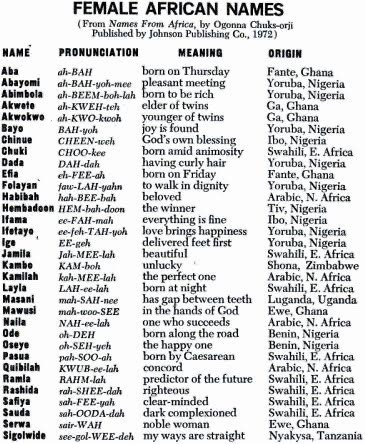
Introduction
African names are a reflection of the continent's incredible diversity, culture, history, and traditions. With over 2,000 distinct languages spoken and a multitude of ethnic groups, Africa is a treasure trove of names that carry deep meanings and unique stories. In this article, we'll explore the rich tapestry of African names, their significance, and the cultural diversity they represent.
The Importance of Names
Names hold a special place in African societies. They are more than mere labels; they encapsulate a person's identity, heritage, and often convey messages of hope, aspiration, and blessings. African names are deeply rooted in the belief that a name can shape a person's destiny and character.
Linguistic Diversity
Africa's linguistic diversity is astounding, with thousands of languages spoken across the continent. Each language group has its distinct naming traditions, resulting in a vast array of names. For example, in West Africa, Akan names such as "Kwame" (born on a Saturday) and "Kofi" (born on a Friday) are common, while in East Africa, Swahili names like "Amina" (trustworthy) and "Nia" (purpose) are prevalent.
Meanings and Symbolism
African names are rich in meaning and symbolism, often reflecting the circumstances of a child's birth, their family history, or the aspirations of their parents. Names can signify virtues like courage, strength, and wisdom or convey hopes for a prosperous and fulfilling life.
Family and Heritage
In many African cultures, names are chosen to honor ancestors, celebrate cultural heritage, or connect the child to their roots. This practice ensures that generations remain connected to their family's history and traditions. For example, the Igbo people of Nigeria often use "Ngozi" (blessing) to convey the hope for a blessed life..
Naming Ceremonies
Naming ceremonies are significant events in many African communities. These ceremonies are joyous occasions where family and friends gather to celebrate the birth of a child and bestow a name. The rituals and customs associated with these ceremonies vary widely, showcasing the diversity of African naming traditions.
Modern Influences
In today's globalized world, African names are not confined to the continent. Many people of African descent living outside Africa proudly bear African names, celebrating their cultural heritage and contributing to the global recognition of the beauty and significance of these names.
Conclusion
African names are a testament to the continent's diversity, culture, and history. They carry profound meanings, connect individuals to their heritage, and celebrate virtues and aspirations. As we embrace and appreciate the beauty of African names, we also acknowledge the importance of preserving and passing on these cultural treasures to future generations, ensuring that the rich tapestry of African identity remains vibrant and thriving.
1. **Kwame (Akan, Ghana):** A male name meaning "born on a Saturday."
2. **Ngozi (Igbo, Nigeria):** A unisex name meaning "blessing" or "good fortune."
3. **Lulendo (Lingala, Congo):** A male name meaning "patient" or "tolerant."
4. **Amina (Swahili, East Africa):** A female name meaning "trustworthy" or "faithful."
5. **Kwesi (Akan, Ghana):** A male name meaning "born on a Sunday."
6. **Nia (Swahili, East Africa):** A unisex name meaning "purpose" or "intention."
7. **Chinwe (Igbo, Nigeria):** A female name meaning "God owns" or "God's own."
8. **Mandla (Zulu, South Africa):** A male name meaning "strength" or "power."
9. **Fatoumata (Wolof, Senegal):** A female name meaning "the great woman."
10. **Kofi (Akan, Ghana):** A male name meaning "born on a Friday."
These are just a few examples, and there are countless other African names with unique meanings and significance. It's essential to remember that Africa is incredibly diverse, and each region and ethnic group has its own naming traditions and languages, contributing to the rich tapestry of African names.
The most popular African names among Black Americans can vary widely based on individual preferences, family traditions, and regional influences. Many Black Americans choose names that connect them to their African heritage and celebrate their cultural roots. Here are a few African names that have been embraced by some Black Americans:
1. **Malik:** This name has Arabic and African origins and means "king" or "ruler."
2. **Amina:** A name of Swahili origin, meaning "trustworthy" or "faithful."
3. **Kwame:** Derived from Akan culture, it means "born on a Saturday."
4. **Nia:** A Swahili name representing "purpose" or "intention."
5. **Imani:** Of Swahili origin, it means "faith" or "belief."
6. **Jamal:** This name has Arabic and African roots and means "handsome."
7. **Ade:** A Yoruba name meaning "crown" or "royalty."
8. **Zuri:** Of Swahili origin, it means "beautiful."
9. **Sekou:** Derived from West African languages, it means "fighter" or "warrior."
10. **Nala:** This name is of African origin and means "gift."
It's important to note that while these names have African origins, their popularity among Black Americans can vary by region and individual choice. Additionally, some Black Americans choose to create unique or hybrid names that blend African and American influences, reflecting their personal and cultural identities. The naming choices among Black Americans are diverse and reflect the rich tapestry of their heritage and experiences.
African Languages: A Tapestry of Diversity and Culture"
Introduction
Africa is a continent known for its stunning natural landscapes, diverse wildlife, and rich cultural heritage. Among its many treasures, the continent boasts an astonishing linguistic diversity that is often overlooked. In this article, we delve into the fascinating world of African languages, exploring their diversity, cultural significance, and the challenges they face in a rapidly changing world.
The Linguistic Kaleidoscope
Africa is home to over 2,000 distinct languages, making it one of the most linguistically diverse regions on the planet. These languages belong to several different language families, including Afroasiatic, Nilo-Saharan, Niger-Congo, and Khoisan, each with its unique characteristics.
Niger-Congo Family: The vast majority of African languages, including Swahili, Yoruba, Zulu, and Kikuyu, belong to the Niger-Congo language family. This family stretches across West, Central, and Southern Africa, reflecting the continent's linguistic richness.
Afroasiatic Languages: Arabic, a member of the Afroasiatic family, has a significant presence in North Africa, while other Afroasiatic languages like Amharic are spoken in the Horn of Africa.
Nilo-Saharan Languages: Found in parts of East and North Central Africa, Nilo-Saharan languages include Dinka, Kanuri, and Nubian.
Khoisan Languages: These languages, characterized by their unique click consonants, are primarily spoken by indigenous groups in Southern Africa, such as the San and Khoi people.
Cultural Significance
African languages are not just tools of communication; they are repositories of cultural heritage and identity. They carry the history, stories, and traditions of their speakers. Each language is a key to unlocking the rich tapestry of African cultures, from oral storytelling and folklore to religious rituals and traditional medicine
Preserving Cultural Diversity
Despite their cultural importance, many African languages are endangered. The rise of global languages like English, French, and Portuguese, often due to colonial legacies, has led to the decline of indigenous languages. To address this, efforts are being made to document, preserve, and revitalize endangered African languages through education, community initiatives, and technology.
A Language of Unity
In some regions, African languages are a means of fostering unity. For example, Swahili, a Bantu language with Arabic influences, serves as a lingua franca in East Africa, promoting communication and cooperation among diverse ethnic groups.
Challenges and Opportunities
While African languages face challenges in an increasingly interconnected world, they also offer unique opportunities. Embracing linguistic diversity can strengthen cultural identities, promote inclusive education, and drive economic growth through multilingualism.
Conclusion
African languages are an integral part of the continent's rich heritage and cultural tapestry. They represent the diversity of Africa's peoples and their traditions. While challenges exist, there is hope that efforts to preserve and celebrate these languages will ensure that they continue to thrive, enriching the world with their unique beauty and significance. In an increasingly globalized world, Africa's linguistic diversity is a testament to the resilience and vibrancy of its cultures.
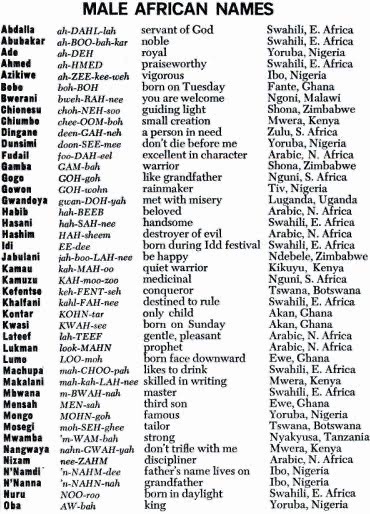
#life#animals#culture#aesthetic#black history#history#blm blacklivesmatter#anime and manga#architecture#black community#language
758 notes
·
View notes
Text










Exploring the beauty and diversity of African hairstyles before colonial influence.
Before colonial influence, African hairstyles were deeply intertwined with cultural identity, social status, and spiritual beliefs. Various tribes used hairstyles to convey significant messages about an individual’s age, marital status, wealth, rank, and even religion.
.
.
.
.
——
#panafrikan #blacktraveljourney #africanhistory #blacktravel #everydayafrica #africancreatives #representationmatters #Moyoafrika #amplifyblackvoices #amplifymelanatedvoices
#african#afrakan#kemetic dreams#africans#brownskin#brown skin#afrakans#african culture#afrakan spirituality#african hair#igbo#Morocco#North Africa
74 notes
·
View notes
Text

Beauty Skincare Model Skin Routine Cosmetics Makeup Photo Ethnic African
"Elevating Beauty: Embarking on the Ethereal Skincare and Makeup Journey of an Ethnic African Model."
#Timeless Radiance#Model's Beauty Regimen#Ethnic African Identity#Cosmetic Artistry#Flawless Makeup Techniques#Beauty Transformation Narrative#Cultural Diversity in Skincare#Daily Beauty Ritual#Model's Makeup Proficiency#African Heritage and Beauty#pretty girl#beautiful women#pretty woman
4 notes
·
View notes
Text
Okay brief post before I sleep, re: the problem of "fantasy dwarves"
Obviously I am no authority on any community that I'm not part of, so I cannot be a final voice on whether or not any particular use of various fantasy people and creatures are good or bad.
However, it also means that when I run into issues like this, it's important to me to get info from multiple sources (even if I don't reblog or share everything I've found) in order to make my own choices for my work. And I recommend the same to everyone!
Because human history is the way that it is, it's pretty much inevitable that the common fantasy people or creatures you want to use in your own new work have at some point, maybe even a lot, been portrayed in ways that are very offensive and bigoted towards real human people. (and this goes for scifi too)
Orcs have commonly been portrayed as some manner of "barbaric savages" with aesthetic details that call to mind Mongolian warriors, Native Americans, and African people, frequently combined with animalistic features.
There was a huge debate on the antisemitic features of goblins in mainstream fantasy, especially around the time JK Rowling was becoming more and more openly bigoted and the issues of racist caricature goblins and house elves in Harry Potter were being made more relevant.
The lore of drow in Dungeons and Dragons is a whole mess of racism and misogyny with their evil matriarchy and slavery situation, not at all helped by their dark colored skin.
Elves are certainly not exempt from this, though they're often taken in the opposite direction and portrayed as wise and beautiful white people who are more civilized than everyone else. And a lot of people have decided to subvert that by making elves into the oppressors. I've done that a little myself.
I'm also writing a lot of characters who don't match my own identity, including some in rather sensitive categories like being trans or having dissociative identity disorder. Those are my two main characters in the book I'm currently writing. I've seen people with DID write very passionate posts trying to dissuade people from ever writing any character with that condition. And I've seen other people with DID encourage the existence of those characters.
Fact is, there is no universal answer to the conundrum of whether or not a particular type of character or fantasy people or creature should be written. There are, I think, clear traits and tropes to avoid because they just can't be subverted in a meaningful way, especially not by people who aren't part of the marginalized groups that are harmed by them.
Like I don't think anyone who isn't Jewish should try to lampshade and openly subvert the antisemitic goblin tropes like the ones you see in Harry Potter.
I have been using fantasy dwarves in my writing, and I've reblogged a post from a person with dwarfism who is very much on the side of fantasy dwarves no longer being used. And I respect that, which is why I reblogged it and why I am still pondering a name change for my own "dwarves". But while I have not posted any links to it, I have in fact watched a video by another person with dwarfism who thinks fantasy dwarves are cool! There is no singular answer here. I'm still thinking about using a different word, and I plan to keep on hearing out different opinions.
I think the most important thing, though, is whether or not my many fantasy people come across as nuanced and respectable or if they come across like bad stereotypes and offensive caricatures. I can rename them all I like, but whether I'm using the word "orc" or "boarin" or whatever you like, does that make it any less offensive if I write them to be savage uncivilized evil barbarians regardless? Is it less offensive to remove the title of "dwarves" and replace it with "cavern folk" if you're still going to write them as angry little men with big heads who only exist for comedic effect?
It is important to be careful of the use of specific words and I think coming up with your own names for fantasy people is a great idea, of course. It's why I have the stroi as another species of elf. But it does kinda bother me when people act like the very use of a word is the main problem and not just one more detail on top of a pile of problems.
27 notes
·
View notes
Text
Shoutout to all Oceanic LGBTQ+ folks.
Shoutout to all Austronesian LGBTQ+ folks.
Shoutout to all Polynesian LGBTQ+ folks.
Shoutout to all Micronesian LGBTQ+ folks.
Shoutout to all Melanesian LGBTQ+ folks.
Shoutout to all Kwaio LGBTQ+ people.
Shoutout to all Papuan LGBTQ+ folks.
Shoutout to all Australian LGBTQ+ folks.
Shoutout to all Kanak LGBTQ+ folks.
Shoutout to all Norfolk Islander LGBTQ+ folks.
Shoutout to all Māori LGBTQ+ folks.
Shoutout to all New Zealander LGBTQ+ folks.
Shoutout to all Aboriginal Australian LGBTQ+ folks.
Shoutout to all Caledonian LGBTQ+ folks.
Shoutout to all Pitcairn Islander LGBTQ+ folks.
Shoutout to all South Sea Islander LGBTQ+ folks.
Shoutout to all Rapa Nui LGBTQ+ folks.
Shoutout to all Nauruan LGBTQ+ folks.
Shoutout to all New Caledonian LGBTQ+ folks.
Shoutout to all Native Hawaiian LGBTQ+ folks.
Shoutout to all Chuukese LGBTQ+ folks.
Shoutout to all Solomon Islander LGBTQ+ folks.
Shoutout to all West Papuan LGBTQ+ folks.
Shoutout to all Fijian LGBTQ+ folks.
Shoutout to all Tahitian LGBTQ+ folks.
Shoutout to all Samoans LGBTQ+ folks.
Shoutout to all Guamanian LGBTQ+ folks.
Shoutout to all Chamorro LGBTQ+ folks.
Shoutout to all Torres Strait Islander LGBTQ+ folks.
Shoutout to all Ambonese LGBTQ+ folks.
Shoutout to all Tongan LGBTQ+ folks.
Shoutout to all Marquesas Islander LGBTQ+ folks.
Shoutout to all Yapese LGBTQ+ folks.
Shoutout to all Kiribati LGBTQ+ folks.
Shoutout to all Niuean LGBTQ+ folks.
Shoutout to all Northern Mariana Islander LGBTQ+ folks.
Shoutout to all Mashellese LGBTQ+ folks.
Take pride in it all. Your culture, your identity, it’s all so beautiful. Celebrate where you are from and who you are. It makes you you, and that is something to be proud of.
post for Middle Easterners, post for Asians, post for Pacific Islanders , post for Hispanics, post for Africans , post for Native Americans, post for Caribbeans
#mental health#positivity#self care#mental illness#self help#recovery#ed recovery#pro recovery#actuallytraumatized#actually cptsd#lgbt#lgbtq#lgbt positivity#lesbian#gay#sapphic#bi#bisexual#mlm#wlw#trans#transgender#Oceania#nonbinary#asexual#aromantic#aroace#intersex#pansexual#genderfluid
803 notes
·
View notes
Text
Queen Latifah RULE BREAKER

We all know this beautiful woman, the woman that set the record and stereotypes straight, starred in our favorite movies, TV shows, and hosted for the best award ceremonies.
Queen Latifah: A Legacy of Empowerment, Art, and Resilience
Queen Latifah—born Dana Elaine Owens on March 18, 1970, in Newark, New Jersey—has been a defining force in music, film, and television for decades. With her powerful voice, trailblazing career, and unwavering sense of self, she has inspired millions across generations. Today, we take a deeper look at her journey from a young girl with a dream to an international icon.
The Origins of the Queen Latifah Name
Queen Latifah’s name tells a story of strength, cultural influence, and self-discovery. Her real name, Dana Owens, was transformed when she was just eight years old. Inspired by a book her cousin brought her that contained Arabic names, Dana chose "Latifah," which means "delicate, sensitive, kind, and nice" in Arabic. But it was the addition of “Queen” that truly shaped her public persona. "Queen" was a deliberate choice that reflected her desire to embrace a strong, proud, and unapologetically Black identity, one that was reinforced by her mother, Rita Owens, who laid the foundation for Latifah's self-empowerment.
As Latifah herself has said, her name represents both her personal growth and her cultural heritage, as well as her wish to project strength and dignity in all that she did. Little did the world know at the time, this name would become synonymous with talent, authenticity, and advocacy.
From Rap to Stardom
Latifah’s rise to prominence began in the late 1980s, during a time when hip-hop was still an emerging genre. A pivotal moment came when DJ King Gemini recorded a demo of her rap song, Princess of the Posse, and shared it with Fab 5 Freddy, the host of Yo! MTV Raps. This moment set the stage for Latifah’s breakthrough, which came when Tommy Boy Records signed her at just 18 years old. In 1989, she released her first single, Wrath of My Madness, marking the beginning of a legendary career in hip-hop.
Her 1993 album Black Reign further solidified her status in the rap world, with the groundbreaking track “U.N.I.T.Y.” becoming an anthem for women’s empowerment. The song addressed issues of street harassment, domestic violence, and disrespect towards women in hip-hop culture, earning her a Grammy Award for Best Rap Solo Performance in 1995. U.N.I.T.Y. remains one of her most iconic tracks, resonating deeply with fans worldwide and sparking conversations about respect and equality.
Breaking Barriers in Hollywood
While her rap career set the foundation for her fame, Queen Latifah’s star power only expanded as she ventured into acting. With standout performances in films like Set It Off (1996), Bringing Down the House (2003), Beauty Shop (2005), and Last Holiday (2006), Latifah proved she was a versatile and powerhouse performer. Her voice also found a home in the animated Ice Age franchise, further demonstrating her ability to conquer multiple entertainment mediums.
Her versatility didn’t stop there. Latifah also made history as the host of her own talk show, The Queen Latifah Show, showcasing her charisma and giving a platform to diverse voices. In every role she took on—whether it was acting, singing, or hosting—Latifah brought a sense of authenticity and confidence that resonated deeply with her audience.
A Role Model for Empowerment
Beyond her success in music and film, Queen Latifah has consistently used her platform to promote social justice and support communities in need. She’s been vocal about the importance of self-love, body positivity, and the representation of African Americans in the media. In her 2010 book, Put on Your Crown: Life-Changing Moments on the Path to Queendom, she opened up about her own struggles with self-doubt, body image issues, and the challenges of navigating a male-dominated music industry. Despite these obstacles, Latifah emerged stronger, becoming a role model for countless women and people of color around the world.
Her activism was also evident in the themes of her music, especially in U.N.I.T.Y., which challenged the toxic masculinity and misogyny that often-plagued hip-hop culture. Through her art, Queen Latifah became a champion for respect and equality, and she has remained committed to elevating marginalized voices throughout her career.
Queen Latifah’s Legacy
Queen Latifah’s influence transcends the worlds of music and film. She redefined what it means to be a woman in hip-hop, proving that success and authenticity could coexist. Her contributions to the genre paved the way for countless other female rappers who followed in her footsteps, helping to reshape the traditionally male-dominated landscape.
Her legacy is one of resilience, creativity, and purpose. From her chart-topping rap albums to her memorable performances in films and television, Latifah has shown that true queens do not simply exist—they create legacies that inspire generations. Her authenticity, passion for her craft, and dedication to social change continue to make her one of the most influential cultural icons of our time.
My Gratitude for Queen Latifah
Growing up watching Queen Latifah, I was always inspired by her energy, confidence, and versatility. Whether she was rapping about unity or taking on a powerful role in a movie, she always commanded the screen. What stands out to me most is her unwavering ability to remain true to herself while breaking barriers in every industry she touched. In a world that often tries to limit people based on stereotypes, Latifah showed us that we could be more than what society expects us to be. She has always been unapologetically herself, and that authenticity is what makes her a true icon.
As I reflect on Queen Latifah’s journey, I am grateful for the legacy she continues to build. She’s not just a rapper, actress, or TV host; she’s a trailblazer who has left an indelible mark on the world.
And to close with one of her most iconic lines: “Now everybody knows there’s exceptions to this rule, now don’t be getting mad, when we playing, it’s cool, but don’t you be calling me out my name, I bring wrath to those who disrespect me like a dame.”
Latifah’s words continue to resonate and inspire—long may she reign as the queen she is!
!*THIS IS RESEARCH I SEARCHED AND WHAT I LIKE ABOUT THE CELEBRITY OR MAIN FACTS THAT STOOD OUT TO ME. FEEL FREE TO INFORM, CORRECT, SHARE, AND/OR ADD MORE KNOWLEDGE YOU KNOW ABOUT THE CELEBRITY.*!
26 notes
·
View notes
Text

The Ndamathia [Kenyan mythology; African mythology]
The Kikuyu are a somewhat lesser-known ethnic group located mainly in central Kenya. These people have (or had, I am uncertain whether this religion is still being practised) a religious ceremony that was held every few decades and was connected to a creature called the Ndamathia, a creature associated with rainbows. It was the Ndamathia which made rainbows appear in the sky.
This being was a giant aquatic snake-like reptile of incredible length (said to be as long as the rainbows it created). At the end of its enormous tail grew magical hairs that had potent medical properties.
A complicated procedure was required to harvest these hairs, however. First, the creature had to leave the deep rivers in which it lives. This was done by summoning it with a special ceremonial horn, and when the Ndamathia was on land, it was distracted by a beautiful girl. The monster was dangerous, however, and had to be drugged with powerful medicine, which was administered by splashing it on the ground before the girl (which was traditionally done by the same young girl). The reptilian creature would then proceed to lick up the water containing the drug.
In addition, the girl was covered in castor oil (which is made from beans of the castor plant) to make her slippery. The idea was that if the monster tried to grab the girl, she would be too slippery to hold and she would escape from its maw.
The Ndamathia then followed the maiden away from the water, but as it was an incredibly long creature, it took multiple hours of walking before its tail finally left the water. A group of warriors was waiting patiently for this moment and jumped at the tail as soon as it was on land.
Each warrior plucked as many hairs as possible. Even though the Ndamathia was under the influence of medicine, plucking its tail hairs caused it great pain and the creature would become furious. It immediately returned to the water at great speed, so the warriors had to hide after plucking the hairs. When the giant creature arrived, it would find nobody and decided to go back to the depths from which it came.
As the story goes, the girl who acted as bait to lure the creature away from the water would have an important position in Kikuyu society when the ceremony was over, as she was regarded as a heroine. The priests would then slaughter an ewe, a bull and a male goat. They would then proceed to cut the skins of the ewe and the goat into ribbons and dip them in a liquid consisting of the blood mixed with the stomach contents of the slaughtered animals. The hairs of the Ndamathia were tied to these ribbons to make bracelets, which were to be worn by the elders on the ankle and wrist. When this was all done, a giant celebration would be held.
When Christianity established a foothold in the region, the missionaries tried to convince the indigenous people that the Ndamathia was actually their version of the Christian devil, and the creature was villainised. This made an impact on the indigenous folktales that is still visible today: the Kikuyu’s translation of the Bible translates ‘devil’ as ‘Ndamathia’.
Sources: Hazel, R., 2019, Snakes, People and Spirits, Volume 1: Traditional Eastern Africa in its Broader Context, Cambridge Scholars Publishing, 567 pp. Kenyatta, J., 1978, Facing Mount Kenya: the traditional life of the Gikuyu, African Books Collective, 260 pp. Karangi, M. M., 2013, The creation of Gikuyu image and identity, in: Revisiting the roots of an Africna shrine: the sacred Mugumo tree: an investigation of the religion and politics of the Gikuyu people in Kenya, p.24 ch.2., Karangi, M.M. (editor), Lambert. Karanja, J., 2009, The Missionary Movement in Colonial Kenya: the Foundation of Africa Inland Church, Cuvillier Verlag, 227 pp. (image source: Steven Belledin. The image is card artwork for Magic: the Gathering and depicts an unrelated seamonster, but I chose it because it fits with the description and I rather like the illustration).
#Kenyan mythology#African mythology#aquatic creatures#monsters#mythical creatures#mythology#bestiary
152 notes
·
View notes